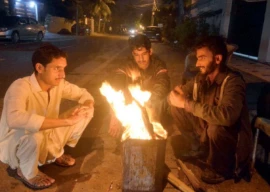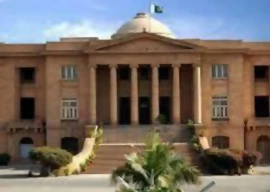
The vocal participants at the workshop held on Wednesday at Hotel Sarawan were determined to continue fighting for their rights.
The workshop started with recommendations on the Sindh Local Government Act, 2013, by former director-general of the National Institute of Public Administration (now National Institute of Management) Mir Jawed Iqbal, who proposed the restoration of all departments that were part of the Sindh Local Government Ordinance, 2001.
Iqbal added that by devolving the Sindh Building Control Authority, Karachi Water and Sewerage Board, Sindh Solid Waste Management Board, charged parking and Karachi Development Authority along with its master plan and traffic engineering bureau to the local government, power will reach the elected representatives and the true spirit of the democracy will be restored.
Iqbal also proposed that control of other functions of the government, which includes the policing system, issuance of driving licences, traffic police, fitness certificate of vehicles, Motor Vehicle Tax, monitoring and control of private schools and hospitals, family council courts and infrastructure and property tax, should be given to the mayor for efficient and effective public service delivery.
In response, Pakistan Debate Council co-founder Abid Ali Umang questioned the justification of giving an elected mayor the duty of picking up garbage outside of hospitals but not allowing him to look into the suffering of the patients in these private hospitals. He added that same is the case with schools and both these things should definitely come under the control of the elected mayor.
Some very interesting comments came from by female participants who expressed frustration over the delay in handing over powers to the elected representatives. Ghazala Memon from district Sukkur said that they understand that it is a deliberate delay in the democratic process but through this the people will continue to suffer. Memon was not alone in this opinion. She also said that she had lost hope as more than eight months have passed and yet there is no hope for them to take charge.
Advising the participants to remain optimistic, journalist and human rights activist Hussain Naqi said that it is too early to lose hope. He recommended that people continue their struggle and create awareness among voters about how their rights are being violated by not allowing the local elected representatives to work. Naqi added that this is the only way for success to be achieved.
Kamla Devi, elected to the Tharparkar district council on a minority seat, said that being unaware, people in rural areas have less courage to fight for their basic rights. "My family faced great pressure from other residents of my area when I was continuing my education after class 10," she said. Devi added that she does not want others to feel the same and has spread the message of education in her hometown and now more than 25 women of her small town are government employees while more 17 works for NGOs. "I want to tell my fellow elected members to not lose hope and keep the struggle going as only local bodies can provide basic necessities to the masses," said Devi.
HRCP Sindh vice-chairperson Asad Iqbal Butt recalled how he once protested at a meeting where the then elected mayor Farooq Sattar was also present but the meeting was being presided over by the commissioner. "Though I have not been a supporter of the Muttahida Qaumi Movement, I could not tolerate a non-elected representative presiding over the meeting," he claimed.
Published in The Express Tribune, July 21st, 2016.

1725030039-0/Untitled-design-(2)1725030039-0-165x106.webp)
1725366721-0/kyle-(1)1725366721-0-165x106.webp)
1731410017-0/BeFunky-collage-(45)1731410017-0-165x106.webp)

1732697578-0/Untitled-design-(5)1732697578-0-270x192.webp)











COMMENTS
Comments are moderated and generally will be posted if they are on-topic and not abusive.
For more information, please see our Comments FAQ